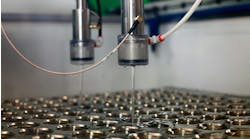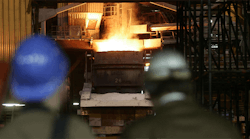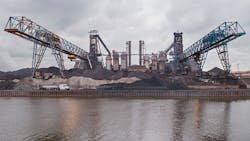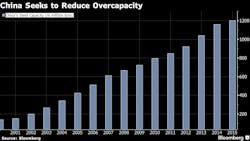River in Cleveland, Ohio.
Photo: Viktor Macha/ ArcelorMittal
Trading was suspended in the listed units of state-run Shanghai Baosteel Group Corp. and Wuhan Iron & Steel Group Corp. as their parents discuss “strategic restructuring,” the companies said in statements on Sunday, without elaborating. The two companies had a combined market value of $16.3 billion as of Friday’s close, and capacity of more than 70 million metric tons. Analysts including those at Citigroup Inc. and Mysteel Research cited the news as heralding a potential merger of the companies.
The talks highlight China’s efforts to overhaul its inefficient state-run sector and bolster an economy headed for its slowest growth in decades. A deal between the two would be the biggest in China’s metals sector since December, when China Minmetals Corp., its biggest trader, agreed to buy a government-owned engineering and mining group, as the nation seeks to reduce overcapacity while creating globally competitive firms.
“The merger of Baosteel and Wuhan Steel fits with the government strategy of improving efficiency and reducing competition and overcapacity,” said Xu Xiangchun, chief analyst at consultancy Mysteel Research. “With these two leading the effort there might be more mergers ahead.”
On the same day that the talks were announced, the chairman of China’s top economic planner, the National Development and Reform Commission, said the nation will cut steel capacity by 45 million tons this year. It had already pledged to reduce capacity by as much as 150 million tons through 2020.
Even though China’s steel output has peaked, the domestic market remains saturated, Chen Derong, general manager at Baosteel, told an industry conference last month. As the nation seeks to clear its surplus, its exports are running at record levels, creating a global glut of the metal and drawing fire from competitors from Japan to the U.S. China’s crude steel-producing capacity reached a record 1.2 billion tons at the end of last year, according to the China Iron & Steel Association.
As such, any merger is unlikely to have much impact on the country’s exports, said Wu Wenzhang, chief analyst for Shanghai Steelhome Information Technology Co. “Exports are a matter of global trade, overseas demand and Chinese products’ competitiveness, which have little to do with a country’s manufacturing capacity,” he said.
China’s net steel exports may remain above 100 million tons this year, Wu added, with domestic steel consumption falling by 20 million tons to about 680 million tons as investment slows and the nation turns to consumption-led growth rather than spending on infrastructure.
News of the restructuring talks gave a substantial lift to steel prices. Reinforcement bar futures in Shanghai rose as much as 6.4 percent, the most in six years, on expectations that a merger would reduce overcapacity, said Wu Zhili, an analyst at Shenhua Futures.
A combined company would leapfrog domestic rival Hesteel Group in terms of production and put it just behind ArcelorMittal in the global rankings. Both firms employ more than 100,000, according to a report by Citigroup on Monday, which said it expects more mergers of China’s state-owned enterprises on the heels of any Baosteel-Wuhan restructuring.
A combination would be “positive for Baosteel in the long-term as the two companies jointly control over 60 percent of autosheet and over 80 percent of the silicon steel market in China,” according to Citi. Both companies are directly under the State-owned Assets Supervision and Administration Commission of the State Council, China’s cabinet.












